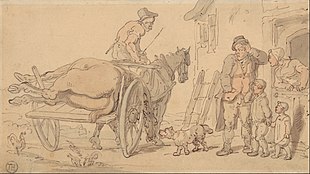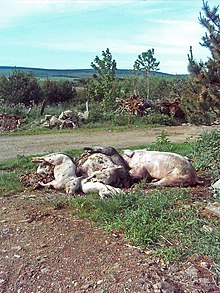A knacker (/ˈnækər/), knackerman or knacker man is a person who removes and clears animal carcasses (dead, dying, injured) from private farms or public highways and renders the collected carcasses into by-products such as fats, tallow (yellow grease), glue, gelatin, bone meal, bone char, sal ammoniac,[1] soap, bleach and animal feed. A knacker's yard or a knackery is different from a slaughterhouse or abattoir, where animals are slaughtered for human consumption. Since the Middle Ages, the occupation of "knacker man" was frequently considered a disreputable occupation. Knackers were often also commissioned by the courts as public executioners.[2]



Etymology
editThe oldest recorded use of the word "knacker" dates to 1812, meaning "one who slaughters old or sick horses" and in 1855 "to kill, castrate", and is believed to be the same word as the earlier knacker/nacker "harness-maker" from the 1570s, surviving in 18th century dialects.[3] The sense extension is perhaps because "knackers" provided farmers with general help in horse matters, including the disposal of dead horses and animals. The word is of uncertain origin, perhaps from the Scandinavian word represented by Old Norse hnakkur, saddle, and related to hnakki, "back of the neck", possibly relating to neck.[3]
Legal definition
editThe term is in this literal sense in British English and Irish English, and gained some notoriety during the outbreak of mad cow disease (BSE) in the United Kingdom. The Slaughterhouses Act 1974, the Meat (Sterilisation and Staining) Regulations 1982, and the Food Safety Act 1990 all define a "knacker's yard" as "any premises used in connection with the business of slaughtering, skinning or cutting up animals whose flesh is not intended for human consumption".[4]
Knackery by-products are rendered under regulation into fats and meat and bone meal for incineration. Cattle hides may be recovered for leather production. The kinds of animal processing which can occur at knackeries are defined by law, for example, in Australia by the Commonwealth Meat Inspection Act 1983.[5] In the EU, the legislation covering knackeries is Regulation (EC) No 1069/2009 of 21 October 2009. It regulates animal by-products and derived products not intended for human consumption.[6]
Slang use
edit"Knackered" meaning tired, exhausted or broken in British and Irish slang is commonly used in Australia, Ireland, Newfoundland, New Zealand, and the United Kingdom. In southern parts of Australia, if something is rendered useless or broken by an inept person, it is said to be "knackered". "Knackers" is also a British/Australasian vulgar slang for testes,[7] although this usage may be derived from nakers – small medieval kettle drums which were typically played in pairs suspended from a belt around the waist.
The term "knacker drinking" refers to the practice of consuming alcohol in the open, e.g. in a field or a park, or by a roadside or canal; the drink is typically cheap cider, beer or vodka from an off licence. "Knacker drinking" is commonly done by teenagers or students.[8][9]
The British satirical magazine Private Eye often refers to senior police figures as "Inspector Knacker" or the police force in general as "Knacker of the Yard", a reference to Jack "Slipper of the Yard" Slipper.[10][11]
Automotive junkyards, salvage yards or recyclers may also be referred to as "knackers' yards" or "knackers".
The word has also been used as a derogatory term against members of the Travelling Community in Ireland. There have been some calls to cease the use of slang terms like "knacker drinking" and "knackered" as a result.[12][13]
References
edit- ^ Chemist, Practical (1844). "Animal Gas, or the Value of Dead Animals". The United States Practical Receipt Book: Or, Complete Book of Reference, for the Manufacturer, Tradesman, Agriculturist Or Housekeeper; Containing Many Thousand Valuable Receipts, in All the Useful and Domestic Arts. Philadelphia: Linsey & Blakiston. p. 320.
- ^ Evans, Richard (1998). Tales from the German Underworld: Crime and Punishment in the Nineteenth Century. New Haven and London: Yale University Press. p. 145. ISBN 9780300072242.
- ^ a b "Knacker". Online Etymology Dictionary. Retrieved 9 July 2018.
- ^ Food Act 1984, Government of the United Kingdom
- ^ "Meat Inspection Act 1983 (Cth)".
- ^ Official Journal if the European Union – Regulations
- ^ e.g. Thomas in The Virgin Soldiers
- ^ "Boyzone hit in row over 'knacker drinking'". independent. 13 March 1999.
- ^ "Knacker Drinking – Main page". www.thegrovesocialclub.com.
- ^ Thompson, Harry (2011). Biography Of Peter Cook. Hodder & Stoughton. ISBN 9781444717839 – via Google Books.
- ^ "Private Eye". Pressdram. 14 January 1983 – via Google Books.
- ^ Russell, Cliodhna (12 October 2016). "'The word knacker makes me feel nervous and ashamed'". TheJournal.ie. Retrieved 29 June 2021.
- ^ Duran, Anagricel (20 June 2023). "Dermot Kennedy apologises after using Traveller community racial slur". NME. Retrieved 3 July 2023.